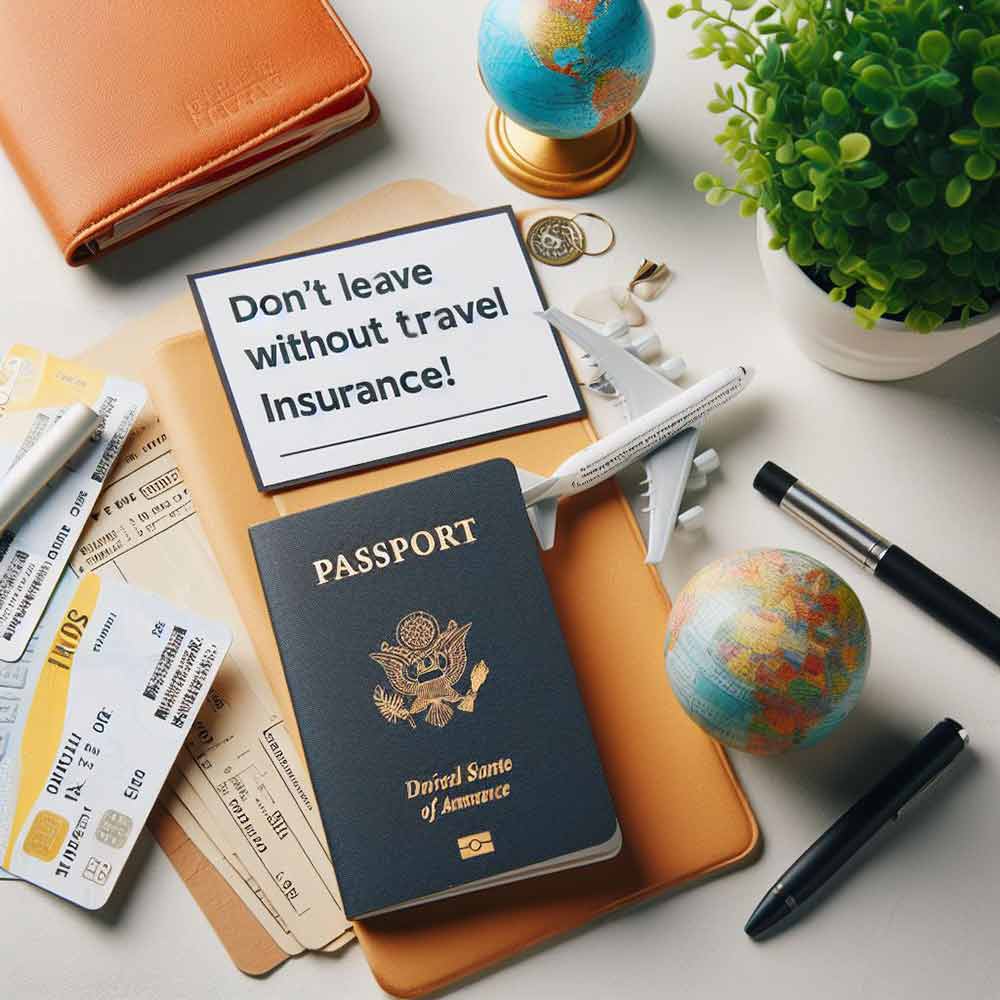Travel Prepared: Your Ultimate Guide to Understanding and Managing Travel Insurance
Your Comprehensive Pre-Travel Guide to Secure and Stress-Free Adventures
Pre-Travel Responsibilities: Managing Travel Insurance
Before you set off on your next adventure, pause for a moment and think about the ‘what ifs’. You know, those unpredictable curveballs life sometimes throws our way. What if there’s an unexpected health hiccup? Or a sudden change of plans that leads to trip cancellation? That’s where travel insurance comes into play.
See, travel insurance isn’t just another item on your checklist; it is a kind of safety net, ready to catch you if things go south. It is like your own personal superhero, swooping in to save the day when unforeseen circumstances pop up before or during your trip.
Now, here is the real kicker: knowing the nitty-gritty of your policy. It is not enough to just buy it; you have got to understand how it works. Know what is covered, what is not, and all the tiny details in between.
If anything seems as clear as mud or if you are scratching your head over any part of your coverage, just give your travel insurance provider a shout. They are there to help clear up any confusion and guide you through the ins and outs of your policy.
So, go on then, get that travel insurance sorted. Step out with confidence, knowing you have got a solid plan in place to tackle any hiccups along the way. After all, it is not just about reaching the destination; it is about enjoying the journey, too. Safe travels!

| Travel Preparation Checklist | Details |
|---|---|
| Is Flight delay coverage included? | Check your insurance policy to ensure you’re covered for any flight delays. |
| Official Government Advisories | Check for any official government advisories related to political instability, terrorism, crime, adverse weather, natural disasters, volcanic eruptions, etc., for your destination. |
| Is your entire family covered? | Review your insurance policy to ensure all family members traveling with you are covered. |
| Stability Period | Understand and review the stability period clause in your insurance policy. |
| Pre-existing Condition Clause | Read through the pre-existing condition clause in your insurance policy. |
| Insurer Eligibility Number | Have the insurer eligibility number on hand and call when applicable. |
| 24/7 Claim Assistance | Ensure you know how to make a collect call to the claim people when out of the country. They are available 24/7 – toll-free or collect. |
| Passport Validity | Check that your passport is valid and isn’t going to expire within 6 months of your planned return to your province or territory of residence. |
| Ticket and Boarding Pass | Keep your ticket and boarding pass (or E-versions of these documents on your smartphone) handy and accessible. |
| Visas and Other Documents | Ensure you have all required visas and government documents providing you with access to the country you are visiting. |
| Insurance Policy & Confirmation of Coverage | Carry your travel insurance policy and confirmation of coverage, including phone numbers for emergency travel assistance. |
| Cash, Cheques, and Cards | Carry sufficient cash, travellers’ cheques, and banking cards for emergencies and daily expenses. |
Source
Call As Soon As Possible If You Have a Claim
You must speak with the claim people before seeing a doctor outside your province of residence. If it is an emergency and you cannot call, go to the nearest hospital or clinic.
If you ever need to make a claim, it is important to get in touch with the claim people as soon as possible. They will be able to guide you through the process and ensure that you receive assistance you need.
Before seeing a doctor outside your province of residence, make sure to speak with the claim people first. If it is an emergency and you are unable to call, head to the nearest hospital or clinic. Once you have found medical help, reach out to the claim people so they can open your assistance file.
Alternatively, you can have someone in your travel party call on your behalf. Remember, the sooner you get in touch with the claim people, the sooner they can help you out.
Claim Representative Will Do Next:
- Open your file and direct you to the nearest clinic or hospital offering the best care.
- They will confirm whether your emergency is covered and, if possible, handle the payment directly so you don’t have to pay upfront.
- Assess your condition and plan follow-up treatment if further care is required.
- Will provide translation services if necessary
Claims Can Be Catastrophic
Filing a claim might be stressful, particularly if you are already under pressure from an emergency. The claim representatives are there to support you during the process and make sure you get the help you require, so keep that in mind.
Emergencies can be very emotional and situations can be complex, especially when you are in a foreign country and dealing with language barriers. However, the claim people are trained to handle these situations and will do everything they can to make the process as smooth as possible.
It is also important to keep in mind that making a claim can come with significant costs and can take up hours of your time. However, the claim people will work with you to ensure that you receive the compensation you’re entitled to.
Remember, the sooner you get in touch with the claim people, the sooner they can help you out.
Emergencies:
- Can be very emotional
- Situations can be very complex
- Language barriers while abroad
- Significant cost(s)
- Can take up hours of your time
- Can be very difficult to navigate

9 Common Mistakes People Make When Buying Travel Insurance.
Managing travel Insurance options can feel like a daunting task, especially when you are trying to shield yourself from unexpected mishaps. Don’t let yourself be caught off-guard! Here is how you can prudently sidestep these common blunders and safeguard your travels with the right insurance.
1. Don’t just chase the price tag
Don’t let an attractive price lure you into a policy that doesn’t cater to your needs. Look beyond the cost and delve into the specifics, ensuring you understand the coverage, deductibles, and any hidden clauses. Remember, cheaper isn’t always better!
2. Honesty is the best policy, literally
Disclose any pre-existing medical conditions upfront. Insurance providers typically do not cover such ailments, and any misrepresentation can lead to claim rejection. Be honest, be transparent, and avoid unpleasant surprises later.
3. Beat the clock
Your insurance policy must be in place before you embark on your journey. This ensures that you are fully protected right from the word go. So, plan ahead and purchase timely!
4. Cover the full journey
Your insurance should span the entirety of your trip, from departure to return. If there is a change in itinerary, let your insurer know. Partial coverage might leave you exposed to risks.
5. Tailor-made coverage: Managing travel insurance
You know your needs best, so choose a policy that aligns with them. Coverage benefits and reimbursement amounts vary across providers, so invest time in comparison and select what suits you.
6. Know thy policy
Make a habit to review your policy before setting off, particularly if it was purchased well in advance. Any changes in your health or circumstances since the purchase should be communicated to your insurer.
7. Adventurous but safe
Planning some adrenaline-pumping activities? Double-check your coverage! Many policies exclude high-risk activities like rock climbing or parachuting. Discuss your plans with your insurer and ensure you’re covered.
8. Understand the fine print of group or credit card insurance
If you are relying on travel insurance from a group plan or credit card, understand its limits. These often have limitations regarding trip duration. If these don’t suit your needs, consider supplementing them with an individual policy.
9. Don’t neglect domestic travels
Don’t assume that your provincial health insurance plan covers all emergency costs outside your province. Even for domestic travel, having travel insurance ensures you are fully covered.
Importance of Managing Travel Insurance
By avoiding these common pitfalls, you can make an informed decision about your travel insurance, managing travel insurance, and enjoy your journey with peace of mind.
Before you set off on your next adventure, take a moment to consider the “what ifs.” You know, those unpredictable curveballs life sometimes throws our way. What if there’s an unexpected health hiccup? Or a sudden change of plans that leads to trip cancellation? That’s where travel insurance comes into play.
Travel insurance isn’t just another item on your checklist; it is a kind of safety net, ready to catch you if things go south. It is like your own personal superhero, swooping in to save the day when unforeseen circumstances pop up before or during your trip.
But here is the real kicker: knowing the nitty-gritty of your policy. It is not enough to just buy it; you have got to understand how it works. Know what’s covered, what is not, and all the tiny details in between.
And hey, if anything seems as clear as mud or if you hare scratching your head over any part of your coverage, just give your travel insurance provider a shout. They’re there to help clear up any confusion and guide you through the ins and outs of your policy.
So go on then, get that travel insurance sorted. Step out with confidence, knowing you have got a solid plan in place to tackle any hiccups along the way. After all, it is not just about reaching the destination; it is about enjoying the journey, too.

Call Glenn Stewart in Kitchener – Waterloo
For Your Travel Insurance Now
1-888-256-8685

